- Home
- Alice Munro
The Beggar Maid Page 22
The Beggar Maid Read online
Page 22
We hate to write bad news but it looks like she has got past where she can look after herself. We try to look in on her but we are not so young ourselves anymore so it looks like maybe the time has come.
The same letter, more or less, had been written to Rose and to her half brother, Brian, who was an engineer, living in Toronto. Rose had just come back from her tour. She had assumed that Brian and his wife, Phoebe, whom she saw seldom, were keeping in touch with Flo. After all, Flo was Brian’s mother, Rose’s stepmother. And it turned out that they had been keeping in touch, or so they thought. Brian had recently been in South America but Phoebe had been phoning Flo every Sunday night. Flo had little to say but she had never talked to Phoebe anyway; she had said she was fine, everything was fine, she had offered some information about the weather. Rose had observed Flo on the telephone, since she came home, and she saw how Phoebe could have been deceived. Flo spoke normally, she said hello, fine, that was a big storm we had last night, yes, the lights were out here for hours. If you didn’t live in the neighborhood you wouldn’t realize there hadn’t been any storm.
It wasn’t that Rose had entirely forgotten Flo in those two years. She had fits of worry about her. It was just that for some time now she had been between fits. One time the fit had come over her in the middle of a January storm, she had driven two hundred miles through blizzards, past ditched cars, and when she finally parked on Flo’s street, finally tramped up the walk Flo had not been able to shovel, she was full of relief for herself and concern for Flo, a general turmoil of feelings both anxious and pleasurable. Flo opened the door and gave a bark of warning.
“You can’t park there!”
“What?”
“Can’t park there!”
Flo said there was a new bylaw; no parking on the streets during the winter months.
“You’ll have to shovel out a place.”
Of course Rose had an explosion.
“If you say one more word right now I’ll get in the car and drive back.”
“Well you can’t park—”
“One more word!”
“Why do you have to stand here and argue with the cold blasting into the house?”
Rose stepped inside. Home.
That was one of the stories she told about Flo. She did it well; her own exhaustion and sense of virtue; Flo’s bark, her waving cane, her fierce unwillingness to be the object of anybody’s rescue.
After she read the letter Rose had phoned Phoebe, and Phoebe had asked her to come to dinner, so they could talk. Rose resolved to behave well. She had an idea that Brian and Phoebe moved in a permanent cloud of disapproval of her. She thought that they disapproved of her success, limited and precarious and provincial though it might be, and that they disapproved of her even more when she failed. She also knew it was not likely they would have her on their minds so much, or feel anything so definite.
She put on a plain skirt and an old blouse, but at the last minute changed into a long dress, made of thin red and gold cotton from India, the very thing that would justify their saying that Rose was always so theatrical.
Nevertheless she made up her mind as she usually did that she would speak in a low voice, stick to facts, not get into any stale and silly arguments with Brian. And as usual most of the sense seemed to fly out of her head as soon as she entered their house, was subjected to their calm routines, felt the flow of satisfaction, self-satisfaction, perfectly justified self-satisfaction, that emanated from the very bowls and draperies. She was nervous, when Phoebe asked her about her tour, and Phoebe was a bit nervous too, because Brian sat silent, not exactly frowning but indicating that the frivolity of the subject did not please him. In Rose’s presence Brian had said more than once that he had no use for people in her line of work. But he had no use for a good many people. Actors, artists, journalists, rich people (he would never admit to being one himself), the entire Arts faculty of universities. Whole classes and categories, down the drain. Convicted of woolly-mindedness, and showy behavior; inaccurate talk, many excesses. Rose did not know if he spoke the truth or if this was something he had to say in front of her. He offered the bait of his low-voiced contempt; she rose to it; they had fights, she had left his house in tears. And underneath all this, Rose felt, they loved each other. But they could never stop the old, old competition; who is the better person, who has chosen the better work? What were they looking for? Each other’s good opinion, which perhaps they meant to grant, in full, but not yet. Phoebe, who was a calm and dutiful woman with a great talent for normalizing things (the very opposite of their family talent for blowing things up), would serve food and pour coffee and regard them with a polite puzzlement; their contest, their vulnerability, their hurt, perhaps seemed as odd to her as the antics of comic-strip characters who stick their fingers into light sockets.
“I always wished Flo could have come back for another visit with us,” Phoebe said. Flo had come once, and asked to be taken home after three days. But afterward it seemed to be a pleasure to her, to sit and list the things Brian and Phoebe owned, the features of their house. Brian and Phoebe lived quite unostentatiously, in Don Mills, and the things Flo dwelt on—the door chimes, the automatic garage doors, the swimming pool—were among the ordinary suburban acquisitions. Rose had said as much to Flo who believed that she, Rose, was jealous.
“You wouldn’t turn them down if you was offered.”
“Yes I would.”
That was true, Rose believed it was true, but how could she ever explain it to Flo or anybody in Hanratty? If you stay in Hanratty and do not get rich it is all right because you are living out your life as was intended, but if you go away and do not get rich, or, like Rose, do not remain rich, then what was the point?
After dinner Rose and Brian and Phoebe sat in the backyard beside the pool, where the youngest of Brian and Phoebe’s four daughters was riding an inflated dragon. Everything had gone amicably, so far. It had been decided that Rose would go to Hanratty, that she would make arrangements to get Flo into the Wawanash County Home. Brian had already made inquiries about it, or his secretary had, and he said that it seemed not only cheaper but better run, with more facilities, than any private nursing home.
“She’ll probably meet old friends there,” Phoebe said.
Rose’s docility, her good behavior, was partly based on a vision she had been building up all evening, and would never reveal to Brian and Phoebe. She pictured herself going to Hanratty and looking after Flo, living with her, taking care of her for as long as was necessary. She thought how she would clean and paint Flo’s kitchen, patch the shingles over the leaky spots (that was one of the things the letter had mentioned), plant flowers in the pots, and make nourishing soup. She wasn’t so far gone as to imagine Flo fitting comfortably into this picture, settling down to a life of gratitude. But the crankier Flo got, the milder and more patient Rose would become, and who, then, could accuse her of egotism and frivolity?
This vision did not survive the first two days of being home.
Would you like a pudding?” Rose said.
“Oh, I don’t care.”
The elaborate carelessness some people will show, the gleam of hope, on being offered a drink.
Rose made a trifle. Berries, peaches, custard, cake, whipped cream and sweet sherry.
Flo ate half the bowlful. She dipped in greedily, not bothering to transfer a portion to a smaller bowl.
“That was lovely,” she said. Rose had never heard such an admission of grateful pleasure from her. “Lovely,” said Flo and sat remembering, appreciating, belching a little. The suave dreamy custard, the nipping berries, robust peaches, luxury of sherry-soaked cake, munificence of whipped cream.
Rose thought that she had never done anything in her life that came as near pleasing Flo as this did.
“I’ll make another soon.”
Flo recovered herself. “Oh well. You do what you like.”
Rose drove out to the County Home. She was conducted through it
. She tried to tell Flo about it when she came back.
“Whose home?” said Flo.
“No, the County Home.”
Rose mentioned some people she had seen there. Flo would not admit to knowing any of them. Rose spoke of the view and the pleasant rooms. Flo looked angry; her face darkened and she stuck out her lip. Rose handed her a mobile she had bought for fifty cents in the County Home Crafts Center. Cutout birds of blue and yellow paper were bobbing and dancing, on undetectable currents of air.
“Stick it up your arse,” said Flo.
Rose put the mobile up in the porch and said she had seen the trays coming up, with supper on them.
“They go to the dining room if they’re able, and if they’re not they have trays in their rooms. I saw what they were having.
“Roast beef, well done, mashed potatoes and green beans, the frozen not the canned kind. Or an omelette. You could have a mushroom omelette or a chicken omelette or a plain omelette, if you liked.”
“What was for dessert?’
“Ice cream. You could have sauce on it.”
“What kind of sauce was there?”
“Chocolate. Butterscotch. Walnut.”
“I can’t eat walnuts.”
“There was marshmallow too.”
Out at the Home the old people were arranged in tiers. On the first floor were the bright and tidy ones. They walked around, usually with the help of canes. They visited each other, played cards. They had singsongs and hobbies. In the Crafts Center they painted pictures, hooked rugs, made quilts. If they were not able to do things like that they could make rag dolls, mobiles like the one Rose bought, poodles and snowmen which were constructed of Styrofoam balls, with sequins for eyes; they also made silhouette pictures by placing thumbtacks on traced outlines: knights on horseback, battleships, airplanes, castles.
They organized concerts; they held dances; they had checker tournaments.
“Some of them say they are the happiest here they have ever been in their lives.”
Up one floor there was more television watching, there were more wheelchairs. There were those whose heads drooped, whose tongues lolled, whose limbs shook uncontrollably. Nevertheless sociability was still flourishing, also rationality, with occasional blanks and absences.
On the third floor you might get some surprises.
Some of them up there had given up speaking.
Some had given up moving, except for odd jerks and tosses of the head, flailing of the arms, that seemed to be without purpose or control.
Nearly all had given up worrying about whether they were wet or dry.
Bodies were fed and wiped, taken up and tied in chairs, untied and put to bed. Taking in oxygen, giving out carbon dioxide, they continued to participate in the life of the world.
Crouched in her crib, diapered, dark as a nut, with three tufts of hair like dandelion floss sprouting from her head, an old woman was making loud shaky noises.
“Hello Aunty,” the nurse said. “You’re spelling today. It’s lovely weather outside.” She bent to the old woman’s ear. “Can you spell weather?”
This nurse showed her gums when she smiled, which was all the time; she had an air of nearly demented hilarity.
“Weather,” said the old woman. She strained forward, grunting, to get the word. Rose thought she might be going to have a bowel movement. “W-E-A-T-H-E-R.”
That reminded her.
“Whether, W-H-E-T-H-E-R.”
So far so good.
“Now you say something to her,” the nurse said to Rose.
The words in Rose’s mind were for a moment all obscene or despairing.
But without prompting came another.
“Forest. F-O-R-E-S-T.”
“Celebrate,” said Rose suddenly.
“C-E-L-E-B-R-A-T-E.”
You had to listen very hard to make out what the old woman was saying, because she had lost much of the power to shape sounds. What she said seemed to come not from her mouth or her throat, but from deep in her lungs and belly.
“Isn’t she a wonder,” the nurse said. “She can’t see and that’s the only way we can tell she can hear. Like if you say, ‘Here’s your dinner,’ she won’t pay any attention to it, but she might start spelling dinner.
“Dinner,” she said, to illustrate, and the old woman picked it up.
“D-I-N-N …” Sometimes a long wait, a long wait between letters. It seemed she had only the thinnest thread to follow, meandering through that emptiness or confusion that nobody on this side can do more than guess at. But she didn’t lose it, she followed it through to the end, however tricky the word might be, or cumbersome. Finished. Then she was sitting waiting; waiting, in the middle of her sightless eventless day, till up from somewhere popped another word. She would encompass it, bend all her energy to master it. Rose wondered what the words were like, when she held them in her mind. Did they carry their usual meaning, or any meaning at all? Were they like words in dreams or in the minds of young children, each one marvelous and distinct and alive as a new animal? This one limp and clear, like a jellyfish, that one hard and mean and secretive, like a horned snail. They could be austere and comical as top hats, or smooth and lively and flattering as ribbons. A parade of private visitors, not over yet.
Something woke Rose early the next morning. She was sleeping in the little porch, the only place in Flo’s house where the smell was bearable. The sky was milky and brightening. The trees across the river—due to be cut down soon, to make room for a trailer park—were hunched against the dawn sky like shaggy dark animals, like buffalo. Rose had been dreaming. She had been having a dream obviously connected with her tour of the Home the day before.
Someone was taking her through a large building where there were people in cages. Everything was dim and cobwebby at first, and Rose was protesting that this seemed a poor arrangement. But as she went on the cages got larger and more elaborate, they were like enormous wicker birdcages, Victorian birdcages, fancifully shaped and decorated. Food was being offered to the people in the cages and Rose examined it, saw that it was choice; chocolate mousse, trifle, Black Forest cake. Then in one of the cages Rose spotted Flo, who was handsomely seated on a thronelike chair, spelling out words in a clear authoritative voice (what the words were, Rose, wakening, could not remember) and looking pleased with herself, for showing powers she had kept secret till now.
Rose listened to hear Flo breathing, stirring, in her rubble-lined room. She heard nothing. What if Flo had died? Suppose she had died at the very moment she was making her radiant, satisfied appearance in Rose’s dream? Rose hurried out of bed, ran barefoot to Flo’s room. The bed there was empty. She went into the kitchen and found Flo sitting at the table, dressed to go out, wearing the navy blue summer coat and matching turban hat she had worn to Brian’s and Phoebe’s wedding. The coat was rumpled and in need of cleaning, the turban was crooked.
“Now I’m ready for to go,” Flo said.
“Go where?”
“Out there,” said Flo, jerking her head. “Out to the whattayacallit. The Poorhouse.”
“The Home,” said Rose. “You don’t have to go today.”
“They hired you to take me, now you get a move on and take me,” Flo said.
“I’m not hired. I’m Rose. I’ll make you a cup of tea.”
“You can make it. I won’t drink it.”
She made Rose think of a woman who had started in labor. Such was her concentration, her determination, her urgency. Rose thought Flo felt her death moving in her like a child, getting ready to tear her. So she gave up arguing, she got dressed, hastily packed a bag for Flo, got her to the car and drove her out to the Home, but in the matter of Flo’s quickly tearing and relieving death she was mistaken.
Some time before this, Rose had been in a play, on national television. The Trojan Women. She had no lines, and in fact she was in the play simply to do a favor for a friend, who had got a better part elsewhere. The director thought to liven all
the weeping and mourning by having the Trojan women go bare-breasted. One breast apiece, they showed, the right in the case of royal personages such as Hecuba and Helen; the left, in the case of ordinary virgins or wives, such as Rose. Rose didn’t think herself enhanced by this exposure—she was getting on, after all, her bosom tended to flop—but she got used to the idea. She didn’t count on the sensation they would create. She didn’t think many people would be watching. She forgot about those parts of the country where people can’t exercise their preference for quiz shows, police-car chases, American situation comedies, and are compelled to put up with talks on public affairs and tours of art galleries and ambitious offerings of drama. She did not think they would be so amazed, either, now that every magazine rack in every town was serving up slices and cutlets of bare flesh. How could such outrage fasten on the Trojan ladies’ sad-eyed collection, puckered with cold then running with sweat under the lights, badly and chalkily made-up, all looking rather foolish without their mates, rather pitiful and unnatural, like tumors?
Flo took to pen and paper over that, forced her still swollen fingers, crippled almost out of use with arthritis, to write the word Shame. She wrote that if Rose’s father had not been dead long ago he would now wish that he was. That was true. Rose read the letter, or part of it, out loud to some friends she was having for dinner. She read it for comic effect, and dramatic effect, to show the gulf that lay behind her, though she did realize, if she thought about it, that such a gulf was nothing special. Most of her friends, who seemed to her ordinarily hard-working, anxious, and hopeful people, could lay claim to being disowned or prayed for, in some disappointed home.
Halfway through she had to stop reading. It wasn’t that she thought how shabby it was, to be exposing and making fun of Flo this way. She had done it often enough before; it was no news to her that it was shabby. What stopped her was, in fact, that gulf; she had a fresh and overwhelming realization of it, and it was nothing to laugh about. These reproaches of Flo’s made as much sense as a protest about raising umbrellas, a warning against eating raisins. But they were painfully, truly, meant; they were all a hard life had to offer. Shame on a bare breast.

 Runaway
Runaway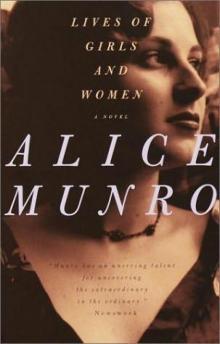 Lives of Girls and Women
Lives of Girls and Women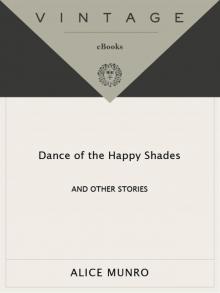 Dance of the Happy Shades
Dance of the Happy Shades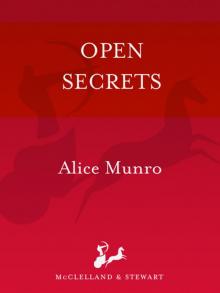 Open Secrets
Open Secrets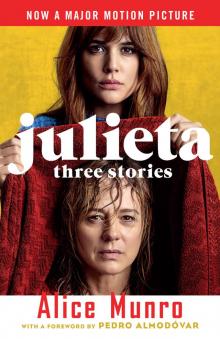 Julieta (Movie Tie-in Edition)
Julieta (Movie Tie-in Edition)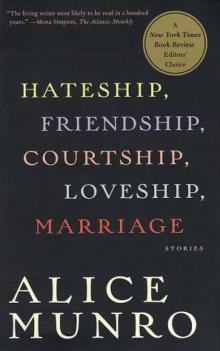 Hateship, Friendship, Courtship, Loveship, Marriage: Stories
Hateship, Friendship, Courtship, Loveship, Marriage: Stories Alice Munro's Best
Alice Munro's Best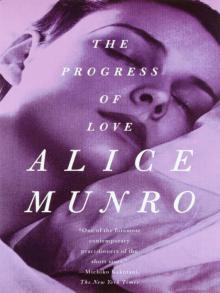 The Progress of Love
The Progress of Love Selected Stories
Selected Stories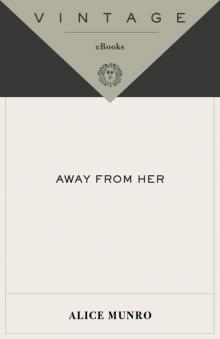 Away from Her
Away from Her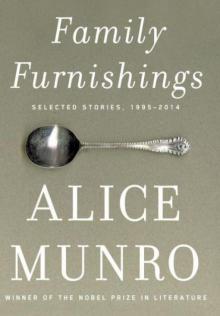 Family Furnishings
Family Furnishings Moons of Jupiter
Moons of Jupiter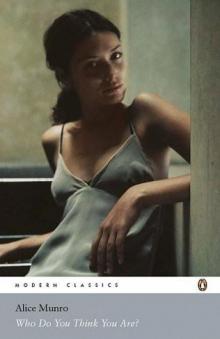 Who Do You Think You Are?
Who Do You Think You Are?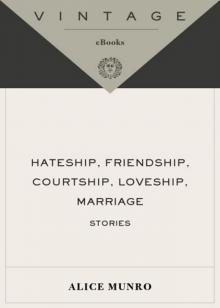 Hateship, Friendship, Courtship, Loveship, Marriage
Hateship, Friendship, Courtship, Loveship, Marriage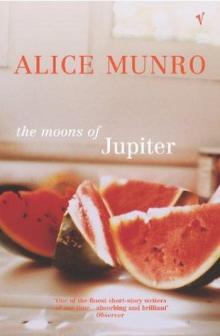 The Moons of Jupiter
The Moons of Jupiter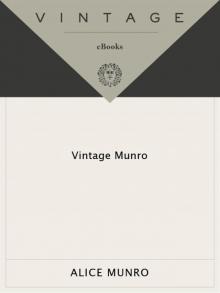 Vintage Munro
Vintage Munro The Love of a Good Woman
The Love of a Good Woman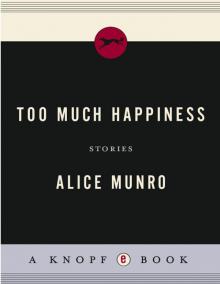 Too Much Happiness
Too Much Happiness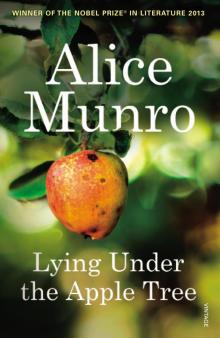 Lying Under the Apple Tree
Lying Under the Apple Tree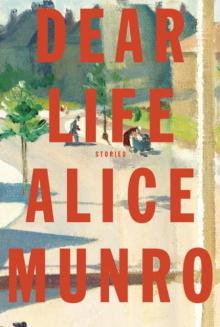 Dear Life
Dear Life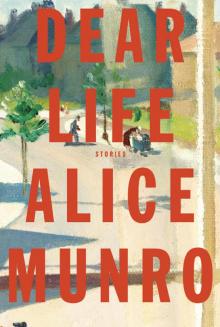 Dear Life: Stories
Dear Life: Stories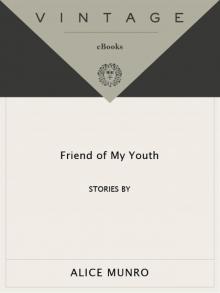 Friend of My Youth
Friend of My Youth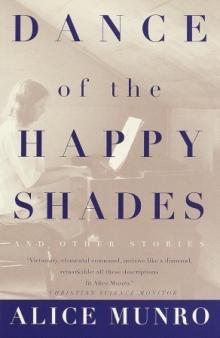 Dance of the Happy Shades: And Other Stories
Dance of the Happy Shades: And Other Stories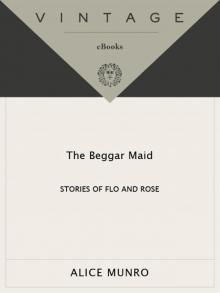 The Beggar Maid
The Beggar Maid